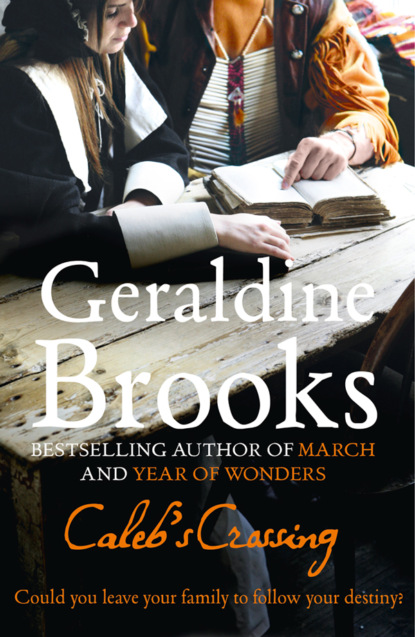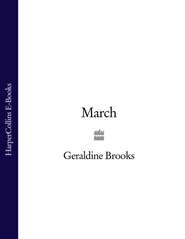По всем вопросам обращайтесь на: info@litportal.ru
(©) 2003-2024.
✖
Caleb’s Crossing
Настройки чтения
Размер шрифта
Высота строк
Поля
There were some half-dozen children running in the fields or about the wetus— fewer than you would expect, given the size of the settlement, which was more than a dozen and a half families. It was just as well they were few, because those there were seemed to run entirely wild, with no check or correction, barreling through the fields in the way of the hoes, interrupting the men’s talk, or snatching at their jacks so as to disrupt the game, piercing the quiet with loud hallows and curdling shrieks. An English child would have been whipped for half of what these were about. Yet I saw no elder do so much as wag a finger at them. I remarked on this to father. He nodded. “They are, as you say, remarkably indulgent. I have remonstrated with them on the matter, asking them why they do not correct their children. But they say that since adult life is full of hardship, childhood should be free of it. It is a kindly view, even if misguided.”
Father had a friendly greeting for everyone, and I was impressed at how much he knew of their doings, their families and their concerns. I learned that he did a great many good turns for them, of a practical nature, and I thought it might be that these preached to them more loudly than his sermons. More than once, I had to suppress a wince when he dropped a word into the mangle of his dreadful pronunciation, so that the meaning came out quite changed from what I knew he had intended. Over time, I had come to grasp that the chief principle of their grammar is whether a thing to them is possessed of an animating soul. How they determine this is outlandish to our way of thinking, so profligate are they in giving out souls to all manner of things. A canoe paddle is animate, because it causes something else to move. Even a humble onion has, in their view, a soul, since it causes action— pulling tears from the eyes. Yet as I had begun to see this strange, incarnate world through Caleb’s eyes, my grammar had much improved, and it pained me to hear father expose himself with his many errors. I blushed when he used an indecent word, quite innocently, thinking he was uttering a beautiful compliment. But these Wampanoag , who clearly loved him, kept their countenance and strove mightily to make out his meaning, so as not to shame him.
At mid-morning, a man was brought to him who was not of the settlement. He came hobbling, supported by two others. It seemed he was a fugitive from the wrath of the Narragansett, a tribe often at odds with the Wampanoag whose lands touched theirs on the mainland. This man had been captured by the Narragansett in a raid, and because one of his captors had had a brother killed in some prior skirmish, this captive had been marked for a slow death by ritual torture. He had somehow escaped when the work was only part done, stealing a mishoon and paddling to the island. The praying Indians had taken him in and now they asked father if he might treat the man’s wounded foot. They described how four of his toes had been severed, one by one, then roasted and given him to eat. I felt my gorge rise at this, and turned my face away lest father divine from my expression that I understood what was being said.
Father, for his part, looked ashen. He murmured to me in English: “They will believe that I have healing skills, no matter what I tell them. It is because of their pawaaws, who profess to be healers. In their minds religion and medicine mean much the same thing. Since they have given up their pawaaw in coming here, I suppose I must do what good I can. . . .”
The injured man had been eased down onto the mat, and now father tried to remove his moccasin, dark with dried black blood. When he saw that the hide was adhered to the man’s flesh, he called for some warmed water. He soaked off the moccasin and set about cleaning the pus from inflamed, swollen flesh, muttering to himself about the barbarity of such wounds. “To do such as this, not in heat of battle, but deliberately. . . . Bethia, it must be granted that these are a very sinful people. Iniquity does abound among them. As the scripture says, the love of many waxeth cold.”
I could see that he needed some clean linen cloths to bind the injured foot, but there were none here. “Should I tear some strips from my placket?” I whispered. He nodded, so I went off into the shelter of some high blueberry bushes and shredded the lower part of my undershift, and brought the cloths back to him.
He dried the mutilated foot, and was struggling with the cloth, making an awkward business of bandaging. “Shall I do it?” I said. “I have a light hand.” He made way for me, and I wrapped the foot as I had seen mother do when we had cuts or burns. Father nodded his approval and the man rose awkwardly. His face, though drawn and sweaty, had betrayed no sign of discomfort even though he must have been in great pain.
As he hobbled away, father looked after him and shook his head. “God in his wisdom has not done so much for these as he has for our nation. Satan has had full charge of them. It is a blessing that God now brings us here. We are uncommonly fortunate to be able to bring that little mustard seed of the gospel, and watch it take root here.”
It was getting near to the noon hour, when father was accustomed to preach. The women were setting down their hoes and the men coming out of the wetus. There were just seven or eight of these huts in the little settlement, domes of bent sapling branches covered in sheets of bark and woven mats, each housing just a family or two. But at the center of the clearing was a long house, with an English door rather than a mat for an entry way. Father said that when the weather was hard he would preach in there, amid a great press of bodies.
This day was fine, so he asked the people to meet him about a great, swaybacked rock, worn smooth through the years to a kind of curved platform. Upon this, he was accustomed to stand to give his sermon.
By noon, some twenty souls had gathered, and I stood at the edge of the group, and tried to look at my father through their eyes. He was a lean man, for unlike Makepeace he worked hard on our farm and did not scruple to chop wood or carry water or do any of the several tasks that eased mother’s lot. He favored the sad colors, blacks or dark browns, as befit a minister, and wore his fair hair modestly cropped above the collars that mother kept spotless and starched for him. Though the day was warm, he did not remove his coat; since the Wampanoag set much store in their own regalia when they met in ceremony, he felt that he should retain some formality in dress, as he would if he preached in church or meetinghouse. First, he prayed, putting our familiar forms into their tongue. These he had by rote, well taught him by Iacoomis, and he uttered them without error. Next came his sermon.
“Friends, hearken to me,” he began. “When we have met here before, we have agreed two truths: That God is, and that he will reward all those who diligently seek him. That the one God is the source of all manit. My friend Iacoomis has shown his heart to you, how it stands towards God, and you have seen how, when he cast off all other false worships, so he has prospered, and gained in health, he and all his family. You have asked what will happen to you when you die, and today I will answer you. Englishmen, and you and all the world, when they die, their souls go not to the southwest, as you have been taught. All that know the one God, who love and fear him, they go up to heaven. They ever live in joy. In God’s own house. They that know not God, who love and fear him not— liars, thieves, idle persons, murderers, they who lie with other’s wives or husbands, oppressors or the cruel, these go to hell, to the very deep. There they shall ever lament.”
Beside me, two men started muttering together, thinking that I could not understand them.
“Why should we believe our English friend, when our own fathers told us that our souls go to the southwest, to the lands of Kiehtan?”
“Well, but did you ever see a soul go to the southwest? I have not.”
“No, and when did he, yonder, see one go up to heaven or down to hell?”
“He says he has it from the book, which God himself has written.”
“What he says may be true for English, but why should I want to go to this God’s house if only English are there? If God wanted us in this house then he would have sent our ancestors such a book.”
Listening to this exchange, I realized my difficulties were no different in kind to my father’s, and that I should just have to persevere, and trust that in time God would give me the words that would turn Caleb’s heart to him.
About midway through my father’s sermon, I noticed that the people seemed restless of a sudden, their eyes glancing from father and over to the place where the clearing ended in dense oak woodland. I followed their gaze, squinting in the sunlight. Soon enough, I saw what they saw: A man, very tall, his face painted and his body decked in a great cloak of turkey feathers. He stood stock still, his arm raised, and in his hand some kind of mannekin or poppet, I couldn’t clearly see. Then, from the trees beside him, another appeared. A youth, also painted garishly.
Some of the crowd started to edge away from father. The man who had remarked about Kiehtan elbowed his companion. I heard him say the name Tequamuck. I flinched, recognizing the name: Caleb’s uncle. I squinted even harder, to discern the features of the wizard and his apprentice. But their faces were so fully painted over I could not tell if what I feared was true or not. Their presence clearly agitated the crowd. Father had long held that the pawaaws were the strongest cord that bound the Indians to their own way, and that breaking their spiritual power mattered far more than interfering with the ways and privileges of the sonquems.
The man who spoke Tequamuck’s name was the first to leave. Soon, five or six more followed. They headed towards the woods, greeting Tequamuck with great deference. When I looked again, all of them were gone.
Chapter VII
I never did ask Caleb if he was the painted youth at the right hand of the pawaaw. I did not want to hear his answer.
As that ripe summer turned to autumn, the sunlight cooled to a slantwise gleam, bronzing the beach grass and setting the beetle-bung trees afire. Caleb learned his letters faster than I could credit. Before the singing of the cider, he could read and speak a serviceable kind of English. I think that because he had learned from childhood to mimic the chirps of birds in order to lure waterfowl, his ear was uncommonly attuned to pitch and tone. Once he learned a word, he soon spoke it without accent, exactly as an Englishman would. In a short while, he would not have me speak Wampanaontoaonk to him except to explicate something he could not grasp, and before long we had switched from communicating with each other only in his language, to conversing most times in mine. But as much progress as we made in that direction, in the matter of his soul he resisted and mocked me, using wit that seemed to me devil-inspired. One day, when we had been discussing Genesis, he turned to me with a gleam in his brown eyes. “So you say that all was created in six days?”
Yes, I said.
“All?” he repeated.
So the Bible instructed us, I said.
“Heaven and hell, also, were created then?”
So it says, and so we must believe. The look on his face was the very same as when he had speared a fine bass. “Then answer me this: why did God make a hell before Adam and Eve had sinned?”
This had never occurred to me to question, but I thought quickly, and replied to him. “Because God knows all, and he knew that they would.”
“Then why did he not scotch the snake before it tempted them?”
“Because he had endowed them with free will,” I said.
“And so do we endow our children with free will, yet you English chide us, and say they are unruly and should be flogged.”
Oftentimes, these exchanges vexed me, and I broke off and rode home struggling for self mastery and resolving to have no further relations with this hard-headed pagan. Yet within a sennight, I would seek him out again, lingering in the places which by now were familiar haunts to both of us until he sprang up in his sudden way, materializing in the tall grasses or beech groves. And so it went on, as another year turned. We each of us grew and changed, gaining new responsibilities in our separate worlds, but always making a space where those worlds could collide and intertwine. As time passed it became harder for me to keep a bright line between my English self and that girl in the woods, whose mouth could utter the true name of every island creature, whose feet could walk trackless through leafbed, whose hands could pull a fish from a weir in a swift blur of motion and whose soul could glimpse a world animated by another kind of godliness.
I had to work ever harder to put that girl from me when I rode back into Great Harbor. I had to learn to leave her behind in the woods; her loose limbed stride, her bold gaze and her easy manners. Lucky for me that I was so long used to considering every word before I spoke it, or I might have given myself away any number of times. Sometimes, when I came inside, mother would look up from her doughtrough or her spindle and, after admiring whatever I had plucked or gathered for the larder, would ask me what I had seen, abroad in the wide world for such hours.
I would share with her some small piece of news, such as a sighting of an otter in an unaccustomed pond, or an uncommon kind of seal I had interrupted, basking on the beach. She would nod, and smile, and pass some remark that fresh air was healthful, and she was glad I could go about so, since she as a girl had lived a town life that did not afford such rambles. One day, she reached a floury hand and touched my face, tucking in an errant hair that had come loose from my cap. Her blue eyes— much bluer than mine— regarded me gravely. “It is a good thing— for a girl,” she said. “It will not be so, when you are become a young woman.” She went back to her kneading then, and I set a kettle to boil the lobsters and we did not speak of it again.
It did not seem pressing then, this truth that my mother had voiced, that one day I would have to leave my other self behind forever: that it could not go on, this crossing out of one world and into another, that something was bound to happen to put an end to all of it. If I had thought clearly, and considered, and prepared my mind for it, I could not possibly have fallen so easily into the sin that brought God to smite us such a terrible blow. Looking back, it is hard to imagine how I could have been such a fool.
It was leaf fall, the third year of my friendship with Caleb. I had gone to the upland woods where huckleberries ripened late. He appeared, as usual, suddenly and unexpectedly from the shadow of a granite boulder. He had with him the catechism I had given him so long ago. He pressed it back into my hands. “After today, I will not walk with you anymore. Do not look for me,” he said.
This sudden pronouncement stung me like a switch. Tears welled in my eyes.
“Why do you cry?” he demanded curtly.
“I do not cry,” I lied. His people consider tears a sign of lappity character.
He took my chin in his hand and tilted my face upward. His fingers were rough as tar paper. He had grown in the two and a half years that I had known him, and was a full head and shoulders taller than I. A big tear spilled down my cheek and on to the back of his hand. He let go of my face and brought his hand to his mouth, tasting the salt upon it and considering me gravely. I looked away, ashamed.
“This is no matter for tears,” he said. “It is my time to become a man.”
“Why should that mean you cannot walk with me?”
“I cannot walk with you because from tomorrow my steps will choose me, not I my steps. Tomorrow will be new hunter moon. Tequamuck will take me to the deep woods, far from this place. There I will pass the long nights moon, the snow moon and the hunger moon alone.” His task was to survive and endure through the harsh winter months, winnowing his soul until it could cross to the spirit world. There, he would undertake the search for his guide, a god embodied in some kind of beast or bird, who would protect him throughout his life. His spirit guide would enlighten his mind and guide his steps in myriad ways, until the end of his life. In those cold woods, he would learn his destiny. He said that if the spirit guide came to him in the form of a snake, then he would gain his heart’s desire, and become pawaaw.
I thought of the quarantine of Jesus, a similar harsh and lonely trial of character and purpose. But that vigil passed in searing desert, not snowy wood. And when, at the end, the devil came with his visions of cities and offers of power, Jesus shunned him. Caleb desired to bid him welcome.
And have no fellowship with the unfruitful ways of darkness. So said the scripture. I had no choice. This marked the end of our friendship. I had to take leave of him. But before I did, I looked down at the catechism he had returned to me. No matter that he lived in a bark hut, his hands ever soiled from bloody hunts and greasy common pots, he somehow had kept the book in the exact condition I had given it him. I pressed it back into those rough hands. “Do not close your heart to Christ, Caleb,” I whispered. “Perhaps he is the one awaiting you out there in the dark.”
I turned away then because I knew I was about to cry in earnest, and I would not have him see me so. I mounted Speckle and threaded a careful way through the trees, but the world was a blur. I felt sick at heart. I told myself it was wounded pride, merely. I had falsely hoped to turn him from the path he was born to follow, and had failed. I told myself it was natural to regret that this pagan ceremony, whatever its nature, would set him at even greater remove from the gospel.
But this, also: I burned to know what he would know when he entered that spirit world. I recalled, too well, the alien power I had felt that long ago day and night on the cliffs. I have said that I would write only the truth here, and the truth is this: I, Bethia Mayfield, envied this salvage his idolatrous adventure.








